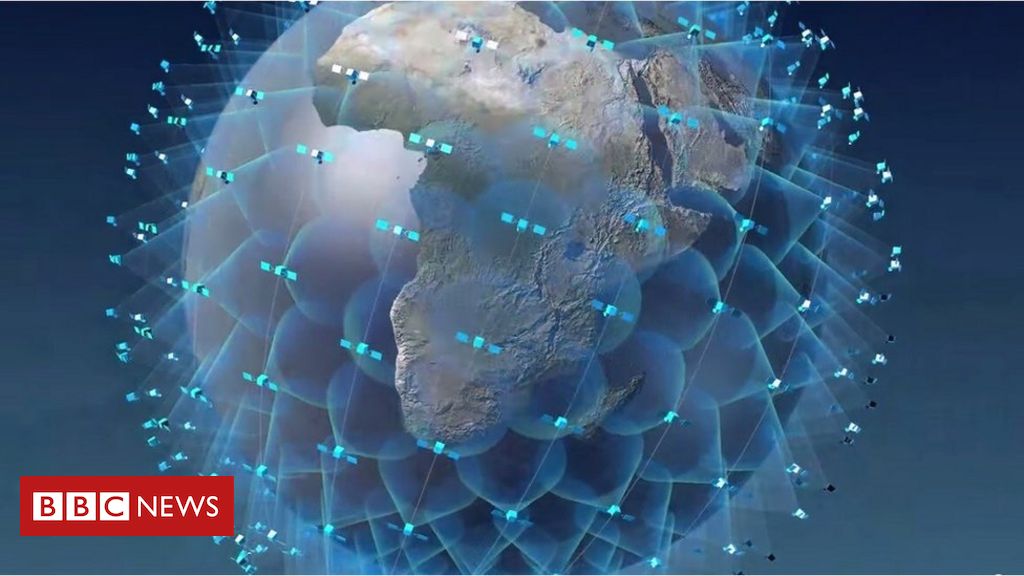Image copyright
OneWeb
Artwork: The government wants OneWeb to run a sat-nav service as well as deliver broadband
The UK is spending $500m (£400m) on a stake in failed satellite firm OneWeb as part of a plan to replace the loss of the EU’s Galileo sat-nav system.
OneWeb went bankrupt in March while trying to build a spacecraft network to deliver broadband.
The UK is part of a consortium with India’s Bharti Global which won a bidding war for the company.
Business Secretary Alok Sharma said it would help deliver the “first UK sovereign space capability”.
The government hopes the network could also work as a replacement for the loss of access to the EU’s Galileo sat-nav system.
In a statement, Mr Sharma said: “This deal underlines the scale of Britain’s ambitions on the global stage.
“Our access to a global fleet of satellites has the potential to connect millions of people worldwide to broadband, many for the first time, and the deal presents the opportunity to further develop our strong advanced manufacturing base right here in the UK.”
The consortium involving the UK government was the highest bidder in an auction for the bankrupt company.
Super-fast broadband
Matters will be clarified on 10 July, when the US Bankruptcy Court for the Southern District of New York rules on the sale.
If the Bharti Global-led option goes through, the UK government will own an equity stake of 45% in the new operation.
The UK government sees satellites as a way to meet commitments on the roll-out of super-fast broadband and believes OneWeb’s constellation could also deliver a precise Positioning, Navigation and Timing service, also known as sat-nav.
The latter has become a political imperative for No 10 since losing membership of Europe’s Galileo satellite-navigation system on departure from the EU in January.
While exceptionally good news for the staff of OneWeb, the decision of the UK government to get involved in the company has raised eyebrows in the wider space sector.
Some of the more established actors have questioned the financial viability of the broadband mega-constellation projects.
SpaceX is building an even bigger network and Amazon has long talked about rolling out its own version.
These are extremely expensive endeavours involving multiple rocket launches – and it’s an ongoing commitment.
The satellites need to be refreshed, to replace ageing and failed units, but also to take advantage of new technological developments.
Such big investments make OneWeb a major gamble for taxpayers, detractors argue.
The $500m (£400m), they believe, could be spent more fruitfully if spread across a wider set of less risky British space projects.
The interesting angle, of course, is the idea that OneWeb’s network could also double as a satellite-navigation service.
It’s not impossible technically, but it is challenging.
The UK’s Satellite Applications Catapult is preparing a white paper to illustrate one potential way of using the initial OneWeb constellation to deliver precise timing for use in the country’s power, telecoms and finance industries.
But experts warn that a bumpy road lies ahead on the issue of the frequencies used to transmit Positioning, Navigation and Timing signals – one that will require international agreement.
OneWeb, which has its HQ in west London and parallel operations in Virginia, US, had initially raised $3.2bn (£2.6bn) of investment to build its mega-constellation.
Seventy-four satellites in an initial network of 648 had been launched when the company announced recourse to bankruptcy protection, blaming the Covid crisis for the inability to raise additional financial support. Most experts believe a further $3bn at least is needed to bring the full constellation into use.
Assuming there are no regulatory blockages put in the path of the consortium plan, OneWeb should soon be able to start pulling back staff who were laid off, and to resume the manufacture and launch of its satellites. The spacecraft are currently made in Florida in a partnership with European aerospace giant Airbus.
OneWeb is headquartered in a former BBC building in west London
There has been talk of this production, or at least some of it, being moved to Britain in future as part of the new arrangements.
Image copyright
ONEWEB
OneWeb launched its first 74 satellites in three batches
Adrian Steckel, CEO of OneWeb, said: “We are delighted to have concluded the sale process with such a positive outcome that will benefit not only OneWeb’s existing creditors, but also our employees, vendors, commercial partners, and supporters worldwide who believe in the mission and in the promise of global connectivity.”
Airbus in the UK welcomed the outcome of the auction.
Managing Director Richard Franklin said: “The UK government’s vision in backing this project will drive innovation and new ways of thinking about how space can contribute even more to the UK economy, and the country’s defence requirements, as well as playing a part in delivering broadband internet to communities across the country.
“We look forward to supporting OneWeb in the next phase of their business and growing the UK contribution to this market-changing business.”
Bharti, through Bharti Airtel, is the third largest mobile operator in the world, with over 425 million customers.
OneWeb’s statement on Friday said Bharti Airtel’s networks would in future act as the testing ground for all the satellite company’s new products, services, and applications.
[email protected] and follow me on Twitter: @BBCAmos


















